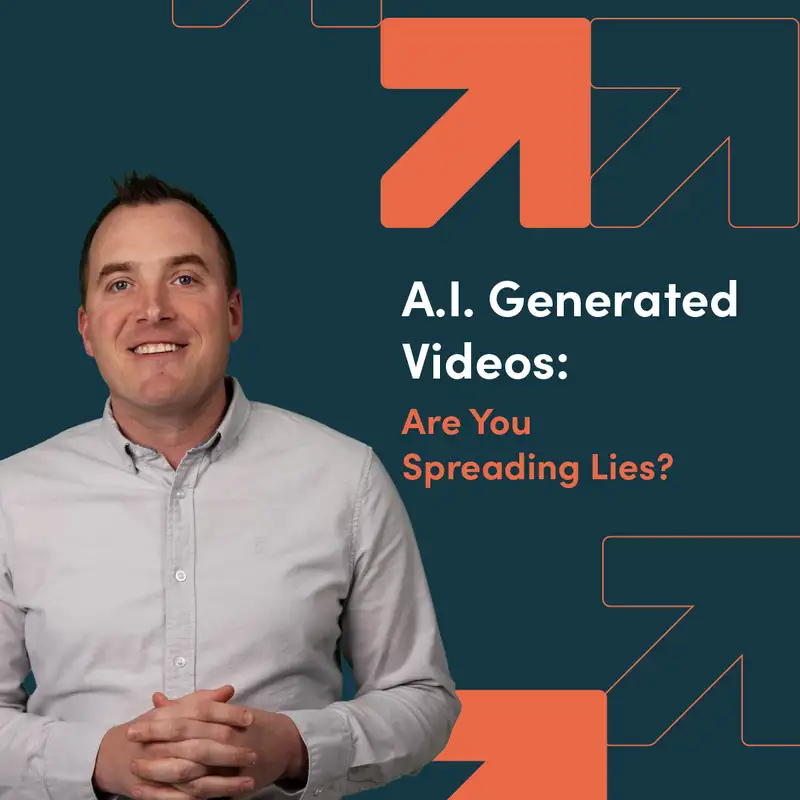A.I. Generated Videos: Are You Spreading Lies?
Hello, everyone. Thanks for listening to Wake Up, Look Up, a podcast where we connect events happening in real time to the gospel of Jesus Christ.
I'm Zach Weihrauch. And in today's episode, we're talking about AI-generated videos, and we're asking the question, are you spreading lies?
Now, this is prompted by an article I read in the Washington Post that was talking about a recent viral video.
Maybe you've seen it. It was on TikTok of bunnies. that stumble onto a trampoline late at night and jump on the trampoline like the way children would do.
It's very funny and it's very cute. It got over 230 million views in one weekend, which is amazing. Very cute, very funny, and as it turns out, very fake.
The video was created by a 22-year-old marketing influencer who is attempting to show how out of date AI video fake evidence is in our world.
In other words, what he was saying is that used to be when AI generated a video, there were some pretty big giveaways, extra fingers, mismatched objects, glitches, but those are obsolete.
You cannot, the naked eye, especially the regular eye like you and me, we cannot look at videos anymore and separate fact from fiction.
No one was saying this video was fake, but it was. In fact, AI detection experts are warning that fun fake videos like this bunny one, really doing no harm, are actually pointing to the fact that we now live in a world where you really can't be sure that any video you watch online is actually true, which is one thing if it's a bunny, but it's another thing if it's a political video, if it's showing so-called events happening in the real world, if it's highlighting conspiracy theories.
Simply put, the kind of standard line of thinking now needs to be, you and I cannot tell real videos from fake ones.
And I think this has massive implications for our culture and even bigger implications for those of us who are Christians, who are living online and liking and sharing videos that we find online.
And so I want to make an argument to you that this is something you need to be careful about. Let me start with this. Truth is God's standard. In fact, the 10 commandments in Exodus 20 say this, you shall not bear false witness.
In other words, you should not say something happened that didn't. You shouldn't lie or share lies. Sharing a video as truth when you know it isn't is of course an obvious lie, but sharing a video as truth when you don't know if it is, is at least a step in the direction of deception.
We have to be more cautious. When we spread lies, we participate in the lie, even if we're not sure 100% that it in fact is a lie.
It's one of the reasons the Bible stresses the discipline of discernment, the work of telling truth from lie, fact from fiction.
The writer of Hebrews in chapter 5, verse 14 says, that we need to be trained by constant practice to distinguish good from evil.
Of course, the writer of Hebrews is talking morality there, which is not easy, but seems a lot easier than looking at a video of bunnies and knowing if it's fact or fiction.
And I'm not arguing that the average Christian becomes an expert in spotting deep fake videos, but I am saying this.
Maybe discernment looks like having a pretty high bar for what we will share and since we know there's a pretty high risk that the videos we come across online are not true.
Remember that Jesus says this in Matthew 12, everyone will have to give an account for every empty word.
Jesus is saying that on the day of judgment, we're accountable to God for all the things we say. That is a frightening thought, especially for someone like me who talks a lot.
But if that is true, then I can't help but feel like we're also going to give an account in modern culture for everything we like, everything we share, everything we retweet, repost, or whatever all the websites are doing.
My point is this. Jesus does hold us accountable. So you might say, well, I share the videos. I don't know if they're real. And I'm not even saying they are real.
I think Jesus would say, you mean it's empty, like empty words. Well, you're accountable. The next thing is this, that we have to guard the church's testimony.
When we share videos that are fake and present them as fact, whether we knew it or not, we show ourselves to be foolish.
And foolish people means that people will assume we have a foolish faith. It's what the Apostle Paul is talking about in 2 Corinthians 8 when he says, take thought for what is honorable in the sight of men.
He's saying that a big, mechanism whereby the gospel moves forward is our reputation, not just in the physical world, but in the online world.
The Apostle Paul also says in Ephesians 5 that we're ambassadors of light. The fruit of light is goodness and righteousness and truth. That's what he says. That's what we need to be about.
And you say, well, Zach, well, what are you saying then? How could I ever know if videos are real? Well, let me tell you this. It would be far better for you and I to simply stop sharing and liking videos online since we can't know if they're true, then it would be to pass off a single false video as true. Stop thinking about the online world as an ethereal world where you're not responsible and instead say that the same accountability and surrender to the Lordship of Jesus that exists in the physical world must exist in the digital one as well.
Stop sharing videos you don't know if they're true. Stop spreading lies and start holding yourself accountable.
Hey, thanks for watching this episode of Wake Up, Look Up. If you enjoyed it, please help us get the word out by sharing it with someone you think might benefit from it. And, while you’re here, make sure to subscribe to our YouTube channel to get further content or even download the CCC app where you'll find even more resources to help you grow in your faith and relationship with Jesus Christ.
Creators and Guests


